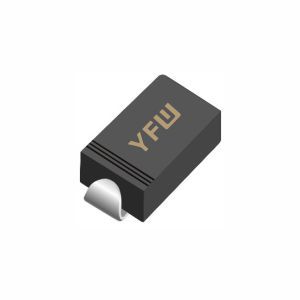Date:2025-05-09 Categories:Product knowledge Hits:459 From:Guangdong Youfeng Microelectronics Co., Ltd
In microwave ovens, high-voltage diodes are an integral part of the high-voltage power supply system for the magnetron, which generates the microwaves. The diode rectifies the high-voltage AC output from the transformer to provide the necessary DC voltage for the magnetron operation. The harsh environment inside a microwave oven, including high temperatures and electrical stresses, demands diodes with excellent thermal and electrical stability. Special attention must be paid to the diode's heat dissipation. Heat sinks may be required to prevent overheating, as excessive temperature can degrade the diode's performance and lifespan. Also, the diode should be able to withstand the transient voltage spikes that occur during the operation of the microwave oven.
3.3 X-ray Machines
high-voltage diodes are used in X-ray machines to rectify the high-voltage output of the generator, providing the DC voltage needed to accelerate electrons towards the anode, creating X-rays. In this application, the diodes must meet stringent safety and performance standards. Any failure of the high-voltage diode could lead to serious malfunctions of the X-ray machine, posing risks to patients and operators. The diodes need to have a high breakdown voltage margin to ensure reliable operation under extreme voltage conditions. Furthermore, their leakage current should be extremely low, as even a small amount of leakage current can affect the quality and consistency of the X-ray output.
4. Installation and Safety Precautions
Proper Mounting: high-voltage diodes should be mounted securely to prevent mechanical vibrations from causing damage. Use appropriate mounting hardware, and ensure that the mounting surface is clean and flat. For high-power applications, consider using thermal interface materials between the diode and the heat sink to improve heat transfer efficiency.
Electrical Connections: Make sure the electrical connections to the diode are tight and well-insulated. high-voltage diodes Loose connections can cause arcing, which not only reduces the efficiency of the circuit but also poses a safety hazard. Use suitable wire gauges that can handle the current without excessive voltage drops.
Isolation and Insulation: Due to the high voltages involved, adequate isolation and insulation measures must be taken. Use high-voltage-rated insulation materials for wires and connectors. Keep the diode and its associated components away from other conductive parts to avoid accidental short circuits. high-voltage diodes
Personal Protection: When working with high-voltage circuits containing diodes, always wear appropriate personal protective equipment, such as insulated gloves and safety glasses. Before handling the components, ensure that the power supply is turned off and the capacitors in the circuit are fully discharged to avoid electric shock.

Previous: Classification, Structure, and Principle of MOSFET